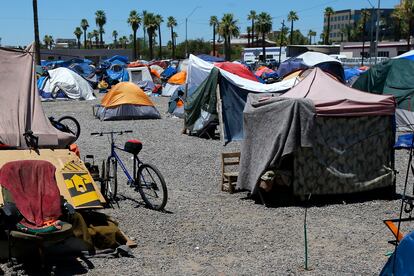Phoenix says it will take more time to clear homeless encampment
The city is developing a space nearby with tents and temporary restroom facilities as an alternative

Phoenix is making progress in complying with a court order to close a large homeless encampment known as “The Zone,” but it will take more time to clear, clean and keep people from setting up tents again in the area, a lawyer representing the city said at a trial Monday.
Attorney Justin Pierce said during opening statements that portions of the encampment on the edge of downtown Phoenix have been cleared since a judge declared the area to be a public nuisance, but other blocks still need to be addressed. He said the process takes time, including making sure those who live there have somewhere else to go.
The city is developing a space nearby with tents and temporary restroom facilities as an alternative, has increased the number of police officers working in the area and has nearly tripled its funding on confronting issues of homelessness, Pierce said. “We can’t simply wave a magic wand and have it all be gone,” Pierce said. “We have to go through a process.”
The purpose of the trial is to examine the city’s efforts to comply with a March 27 order that concluded the city had stopped enforcing certain laws in the area and required the city to lessen the public nuisance.
Ilan Wurman, a lawyer representing property owners and residents who sued the city over the encampment, told the judge that the city is responsible for the public nuisance by allowing people to set up tents on city property.
Wurman argued that a court order for the campground that’s being developed nearby to ensure streets are clean and that tents aren’t pitched on streets that have already been cleared.
One of Wurman’s clients, warehouse owner Ian Francis Likwarz, testified that he has had problems with people using the bathroom outdoors and doing drugs around his business. He said the nuisance hasn’t been lessened. “The city is dragging their feet,” Likwarz said.
In the March decision, Judge Scott Blaney sided with business owners and residents. He found that while the city was following a law against criminalizing public camping, it arbitrarily enforced others despite health and safety risks. Those who filed the lawsuit described having to witness drug activity, lewd acts and other criminal activity in front of their door or steps away from their property.
Like several other major cities, Phoenix has had to balance the concerns of employers and homeowners with respecting the rights of homeless people.
The U.S. 9th Circuit Court of Appeals ruled in 2019 that homeless people cannot be criminalized for sleeping outside if no alternatives exist.
This civil suit is one of two facing Phoenix.
The American Civil Liberties Union of Arizona argued in a federal lawsuit that the city is violating the constitutional rights of unhoused people by slowly clearing the area.
U.S. District Court Judge G. Murray Snow, however, declined the ACLU’s request in May to declare Phoenix in contempt of a ruling he issued in December. Snow said he would not bar the city from further cleanups at the encampment site pending another hearing.
In the December ruling, Snow ordered the city to refrain from enforcing camping and sleeping bans against people who cannot obtain shelter, nor can their property be seized.
Sign up for our weekly newsletter to get more English-language news coverage from EL PAÍS USA Edition
Tu suscripción se está usando en otro dispositivo
¿Quieres añadir otro usuario a tu suscripción?
Si continúas leyendo en este dispositivo, no se podrá leer en el otro.
FlechaTu suscripción se está usando en otro dispositivo y solo puedes acceder a EL PAÍS desde un dispositivo a la vez.
Si quieres compartir tu cuenta, cambia tu suscripción a la modalidad Premium, así podrás añadir otro usuario. Cada uno accederá con su propia cuenta de email, lo que os permitirá personalizar vuestra experiencia en EL PAÍS.
¿Tienes una suscripción de empresa? Accede aquí para contratar más cuentas.
En el caso de no saber quién está usando tu cuenta, te recomendamos cambiar tu contraseña aquí.
Si decides continuar compartiendo tu cuenta, este mensaje se mostrará en tu dispositivo y en el de la otra persona que está usando tu cuenta de forma indefinida, afectando a tu experiencia de lectura. Puedes consultar aquí los términos y condiciones de la suscripción digital.








































